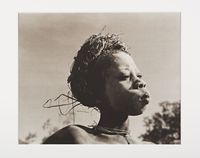
Hauser & Wirth is proud to present the first gallery exhibition in the United States by British photographer Sir Don McCullin, CBE, including a selection of his acclaimed images of war from around the world and societal upheaval in his home country. This show is a prelude to McCullin's forthcoming retrospective at Tate Britain in 2019, which will be the museum's first survey for a living photographer.
The exhibition at Hauser & Wirth introduces American audiences to the photographer's unique ability to convey the emotion and humanity of his subject matter with the unvarnished grit of traditional photojournalism.
The majority of works on view are limited-edition platinum prints, created through a special photographic process that delivers a particularly wide range of tones unattainable in more conventional gelatin silver prints. McCullin's technical preferences amplify the humanity expressed by his photographs: 'This work is therapeutic,' he says. 'I couldn't be happier than when I am standing in the cold on Hadrian's Wall, waiting for the right light. The platinums are the essence. They are as far as you can go with what I am trying to do and say.'
In addition to images of McCullin's travels throughout the Middle East, Southeast Asia, and the English countryside, Hauser & Wirth's presentation brings together McCullin's indelible visual record of the construction of the Berlin Wall and the conflict in Northern Ireland. A few of McCullin's remarkable photographs of the Vietnam War will also be exhibited here on the occasion of the 50th anniversary of the bloodiest year of that conflict.
The exhibition will be accompanied by an installation in the Book & Printed Matter Lab, comprising archival materials from the photographer's six-decade long career, including video footage, ephemera, and, most notably, his camera with a bullet hole that quite literally saved his life.
The exhibition begins with photographs of Northern Ireland, Berlin, and the Vietnam War that capture the human suffering McCullin witnessed. Growing up underprivileged in 1930s London and experiencing the ignorance, poverty, and bigotry associated with his own socioeconomic circumstances, the photographer is driven by a profound empathy for those less fortunate - a defining characteristic in his work.
Innately drawn to deep-seated conflicts, McCullin has spent decades documenting horrific situations around the world for an audience that might otherwise remain unaware. Harsh and bloody truths are revealed by his extensive documentation of the Vietnam War, where McCullin risked his life alongside those in combat. While many of his photographs from Vietnam bear witness to the daily atrocities against civilian, the images on view at Hauser & Wirth focus upon American soldiers and the physical and emotional impact of war on their bodies and soul. Wounded Soldier against Wall, Vietnam, 1968 reveals McCullin's uncanny ability to frame subjects within religious and art historical visual tradition: this image of a wounded Marine, supported by two of his comrades, recalls the deposition of Christ from the cross, thereby generating a deep sense of spiritual communion with McCullin's subject.
Similarly, the composition of US Troops, Friedrichstrasse, Berlin, 1961, references the architecture of Orsanmichele in Florence, where statues of saints and patrons of various guilds ornament niches circumscribing the building's exterior. McCullin's photograph substitutes the saints for US troops on the lookout in the empty windows of a vacant building, forever frozen in contrapposto poses. The dramatic perspective of this shot, combined with the subtle reference to Renaissance Christian iconography, suggests his sympathetic reverence for the soldiers' sacrifice.
Through all of his assignments, from the Vietnam and Biafra Wars, to the conflict in Northern Ireland, the Lebanese Civil War, the Belgian Congo crisis, the Russian invasion of Afghanistan, and the fall of Cambodia's capital, Phnom Penh, McCullin has faced countless challenges and setbacks: wounded in Cambodia, he fell from a roof in Salvador during a gun battle and was imprisoned by the Idi Amin dictatorship in Uganda. He also contracted cerebral malaria in West Africa.
The exhibition further unfolds with images from McCullin's travels to Ethiopia, India, Indonesia, Libya, Lebanon, Syria, and the Sudan - locations where he documented local rituals, festivals, architecture, and people, enabling Western viewers to meditate on the expansiveness of world culture and daily praxis. India, The Great Elephant Festival, The River Gangak, 1993 depicts a crowd under a leafy canopy decorated with flowing fabrics illuminated by afternoon light. People encircle a central female figure turning toward the camera and away from the festival underway. The photograph exemplifies McCullin's ability to engage his subjects' gaze, transforming mere documentation into a direct dialogue with the viewer.
Among works on view are McCullin's images of the English countryside and of his home in Somerset, England - more pastoral photographs that in their stark contrast to the images depicting violence, remind viewers that war and peace are forever in opposition. Over the last two decades, McCullin has turned his eyes to the world immediately surrounding him, citing the sweeping rural landscape as his greatest salvation and his final ode to a life of dearly wished-for peace.
Press release courtesy Hauser & Wirth.
901 East 3rd Street
Los Angeles, 90013
United States
www.hauserwirth.com
+1 213 943 1620
+1 213 943 1621 (Fax)
Tuesday – Sunday
11am – 6pm